 MyDogBreeds
MyDogBreedsRussian Setter is originated from Russia but Grand Griffon Vendeen is originated from France. Russian Setter may grow 23 cm / 10 inches higher than Grand Griffon Vendeen. Russian Setter may weigh 12 kg / 27 pounds more than Grand Griffon Vendeen. Both Russian Setter and Grand Griffon Vendeen has same life span. Both Russian Setter and Grand Griffon Vendeen has almost same litter size. Both Russian Setter and Grand Griffon Vendeen requires Moderate maintenance.
People often think it is ridiculous that a Setter dog comes from Russia. It is believed that the Russians did have some kind of Griffon and the word Pointer is also often translated as Setter.
It is believed that the Russian Setter is one of the ancestors of the Wire-haired Pointing Griffon and that it possibly shared an ancestry with the German wire-haired and broken-haired pointers.
References to Russian Setters were fairly common in the 19th century, but there is such contradictory information that it is hard to get good information on the dogs. The Russian Setter is believed to have existed before the Russian Revolution resembling the English Setter. Dog experts tell us the dog no longer exists.
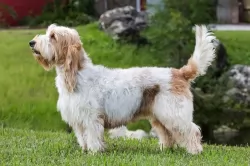 The Grand Basset Griffon Vendeen is a French scenthound that has changed over many centuries. Today the area in France where they originate from, has contributed to the dog's looks.
The Grand Basset Griffon Vendeen is a French scenthound that has changed over many centuries. Today the area in France where they originate from, has contributed to the dog's looks.
The rocky and thorny region of Vendeé required a hardy breed of dog. Also, hunters wanted a slower hound that they could keep up with and the idea was to shorten the legs of the dog.
By the end of the 19th century, the Basset Griffon Vendéen was developed. By the 1950s, the Grand was considered a separate breed.Today the dog is a long-backed and short-legged hunting dog.
In terms of appearance, it was John Henry Walsh who said that the Russian Setter was a dog hidden by its long, woolly matted coat.It seems to have been a medium sized dog with an elegant appearance. It seems the dog came in two varieties - the curly coated liver coated dogs and the fawn colored dogs which are straight coated.
Because there is very little information on these dogs, we assume they were between 57 – 68cm in height and between 27 and 32kg in weight. The coat was no doubt in colours such as grey, reddish-brown with some black and white and shortish and wiry. The ears were floppy,and the face no doubt had some longer hair around the muzzle.
Nobody seems to know exactly what the temperament of this dog was, but when you look at some of his ancestors you can assume that he was strong-willed, confident and a skilled hunter.
He would have required a lot of exercise too. He was lively and energetic. Because he had Pointer in him you can be sure that he would have been intelligent so that he could be trained and socialized.
He would have been keen to learn with an owner who was firm and consistent in his treatment of him. He is a dog most happiest when he can spend time with his human family, a most loyal and devoted family friend, capable of getting on well with children and pets in the home.
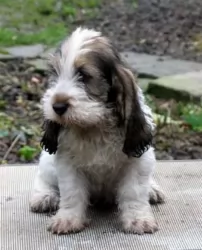 Kept today essentially as a domestic pet, the Grand Basset Griffon Vendéen is a strongly built dog, a rough-coated scent hound of medium size standing at roughly 39 to 45cm in height and weighing 18 to 20kg.
Kept today essentially as a domestic pet, the Grand Basset Griffon Vendéen is a strongly built dog, a rough-coated scent hound of medium size standing at roughly 39 to 45cm in height and weighing 18 to 20kg.
The coat is medium length, shaggy and wiry. It is essentially white with orange markings. Sometimes he can be tri-colored, having a combination of orange, black or tan markings. The double coat is actually regarded as his defining characteristic, being shaggy with a wiry texture that sets him apart from other hound breeds.
His legs are straight, and he is longer than he is tall. He is a deep chested dog with long ears and a long tail. He is also noted for his mustache and beard with long eyebrows.
Your Grand Basset is a courageous, happy, confident dog. He is active and has great stamina. As a social, pack dog, he likes plenty of time spent with his owner, failing which the owner should invest in another dog too so as to be part of a pack. He will get on great with children and he is also a pet-friendly breed who will get on well with cats too. He is sharp and alert and responds well to training and socialization.
It appears, according to records that the Russian Setter has come and gone. However he would have been a calm, gentle pet with running ad hunting keeping him happy. He would therefore have required a lot of exercise.
We can assume that according to the few records that there are, that this was an affable, pleasing dog breed which made a great family pet.
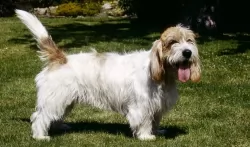 This long-backed, short legged hunting dog has a happy, confident personality. While he was used originally for hunting, he is now commonly kept as a companion.
This long-backed, short legged hunting dog has a happy, confident personality. While he was used originally for hunting, he is now commonly kept as a companion.
He is energetic and independent and will require you having him join you for walks and a ball game too.
Non-aggressive and adaptable he can live in the city or in the countryside so long as he receives plenty of attention and love – then he'll be a splendid pet.
The Russian Setter had an average lifespan of 10 – 14 which is a fairly good innings for a dog. Nonetheless you would have had to be aware of some common dog problem. These dogs were prone to major health issues such as both hip and elbow dysplasia, deafness, epilepsy and hypothyroidism.
The thyroid glands produce hormones that affect the function of many parts of the body. Dogs with this illness have a low production of thyroid hormones.
This disease is mainly caused by inflammation or shrinkage of the thyroid gland. The most common signs of low thyroid in dogs is thinning of the fur, the coat is dull, there is weight gain and excess shedding. The dog doesn’t tolerate cold well either. These dogs also often have ear infections.
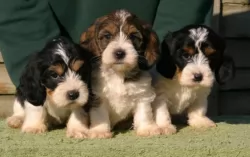 There are some Basset Griffon Vendéens that have reached 17 years of age. This is excellent for these dogs, and lifestyle, nutrition and exercise can all play a part in the longevity of any dog. While he is a pretty robust canine, you'll want to be aware of some of the diseases which may require veterinary intervention.
There are some Basset Griffon Vendéens that have reached 17 years of age. This is excellent for these dogs, and lifestyle, nutrition and exercise can all play a part in the longevity of any dog. While he is a pretty robust canine, you'll want to be aware of some of the diseases which may require veterinary intervention.
Cancer is a major cause of death in elderly dogs, but if caught early, the dog can be cured. These cancers can be malignant lymphoma, skin cancer, bone cancer or soft tissue sarcomas. You'll notice a lump on your pet or a wound that won't heal. When you notice your dog not feeling well, get him to the vet.
Common forms of heart disease in dogs is valvular disease, heart-worm disease and myocardial disease. The signs of heart disease in your pet will depend on the severity of the disease and type.
As heart disease moves on to congestive heart failure, you'll notice symptoms such as difficulty with breathing, fatigue, loss of appetite and weight loss. You need to get your dog immediately to the vet.
Dog allergies can be caused by pollen, medications, food or insects. Your pet will be scratching, he'll have watery eyes and inflamed skin. This inflammatory condition can cause a lot of agony for your pet, driving him mad with the itch and pain. Relieve his discomfort by getting him to the vet as soon as possible.
Whatever kind of coat the Russian Setter ad it would have required a brushing twice a week to keep it in top form.
The medium length floppy ears would have to be checked inside for ear infection.
His owners would have checked inside the mouth for any signs of rotten or bad teeth.
His nails would have required trimming.
Dogs need the best food there is to stay healthy. The Russian Terrier, if it were still around today, would have had the best commercially manufactured food there was.
You want to provide dogs with some good homemade food too. Dogs thrive on simplicity and consistency to avoid upsetting the stomach. Some home-cooked food such as boiled chicken, sweet potatoes, brown rice or pasta, carrots and spinach would be perfect for him. Chop the food up finely and add it into the dry kibble once or twice a week. Raw meat should also be added in when possible to promote good skin health.
Make sure your pet is never without a constant supply of fresh, cool water.
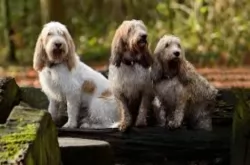 If you are going to be feeding your Grand Basset Griffon Vendéen kibble, there are manufacturers who bring out excellent foods which are breed-specific formulas for age, size and energy levels of dogs.
If you are going to be feeding your Grand Basset Griffon Vendéen kibble, there are manufacturers who bring out excellent foods which are breed-specific formulas for age, size and energy levels of dogs.
Feeding a dog is an individual choice, but good food can increase his longevity. A bit of raw meat mixed into his kibble, or some cooked brown rice, vegetables and chicken will be excellent for him and can add some tasty variety to his diet.
Fresh, cool water must always be available at all times.
The Grand Basset Griffon Vendeen’s coat is double and the rough, harsh coat will need brushing twice a week and stripped once a year.